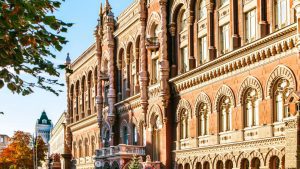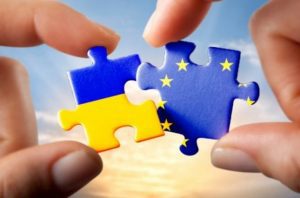
The independent and professionally governed National Bank of Ukraine (NBU) is critical for macro-financial support from the European Union and other international partners, Head of the EU Delegation to Ukraine Matti Maasikas has said.
“A strong, independent and professionally run NBU is critical to Ukraine’s financial stability, banking sector reform, investment, economic development to benefit Ukraine’s citizens, and macro-financial support from the EU and other international partners,” he wrote on Twitter on Thursday.

The Verkhovna Rada intends to amend the Tax Code of Ukraine to support culture, tourism and creative industries.
Some 273 MPs voted in favor of bill No. 3851 at first reading.
According to an explanatory note to the bill, the document proposes to introduce tax mechanisms to provide state support to the spheres of culture, tourism and creative industries in order to prevent their stagnation, preserve and create new jobs.
The bill, in particular, proposes not to tax corporate profits, income of individuals, and a single income tax in the form of a cultural grant.
According to the bill, a cultural grant means “targeted assistance in the form of funds or property, which are provided on a free and irrevocable basis at the expense of the national and/or local budgets, international technical assistance for the implementation of a project or a program in the fields of culture, tourism and creative industries.
In addition, in terms of value added tax, it is proposed not to tax operations on import into the customs territory of Ukraine (import of goods) that are part of the national cinematic heritage.
It is also proposed not to tax certain operations for the supply of national films until January 1, 2025, and from January 1, 2023 to January 1, 2025, not to tax operations on the supply of services for the demonstration, distribution and screening of national films and foreign films that are dubbed, voiced in the state language on the territory of Ukraine, provided that such films are adapted, in accordance with the legislation, in the Ukrainian language version for persons with visual and hearing impairments.
BENEFITS, CREATIVE INDUSTRIES, CULTURE, SUPPORT, TAX, TOURISM

President of Ukraine Volodymyr Zelensky submitted to the Verkhovna Rada a bill of Ukraine on government support for investment projects with significant investments – the so-called law on “investment nannies,” Deputy Head of the Presidential Office Yulia Kovaliv has said.
“I want to debunk the myths and memes about the ‘nannies’ that have flooded the media space and emphasize that this bill is primarily about providing a number of stimulating instruments of government support for investment projects,” she wrote on her Facebook page on Wednesday.
In particular, according to her, the bill provides for: securing investor guarantees by concluding a direct agreement with the Government of Ukraine for 15 years, appointing an investment manager authorized to accompany the investor in the process of preparing and implementing the project; providing tax benefits – exemption from income tax, exemption from payment of duties and VAT when importing new equipment into Ukraine; facilitating the provision of land necessary for the implementation of the project; building/reconstructing related infrastructure at the expense of the state (roads, electric and gas, heating networks, water networks, utilities, etc.).
“I want to note that the total amount of government support will be up to 30% of the amount of investment in the project,” Kovaliv said.
She said that this bill will support Ukrainian and foreign investors, whose investment amount should be at least EUR 30 million. They should create at least 150 new jobs with an average salary of workers at least 15% higher than the average salary in the relevant field in the region. Projects must be implemented in five years, and the duration of the special investment agreement with the government of Ukraine is 15 years.

The industrial community of Ukraine is against ordering 16 modern Mark VI patrol boats and the equipment they need for $600 million from the United States, the press service of the Ukrainian League of Industrialists and Entrepreneurs (ULIE) has said.
“The main duty of the authorities is to take care of the economic development of their own country, filling their own state budget, creating jobs at home. The orders in question only contribute to the growth of foreign budgets and stabilize the situation with employment in other states and do not help overcome crisis in our country. This is unacceptable and irresponsible,” the ULIE President, the chairman of the Anti-Crisis Council of Public Organizations, Anatoliy Kinakh, said.
In addition to ordering boats, industrialists pay attention to the purchase of imported locomotives and helicopters, which, in their opinion, could threaten serious socio-economic consequences for the whole country.
Kinakh emphasized that Ukraine has its own shipbuilding industry – highly professional production facilities, including in Mykolaiv, which are capable of building modern military boats and other small tonnage ships with a certain modernization.
“At this difficult time, the responsible government must develop both a national strategy for industrial and innovative development, and separate programs for shipbuilding, other priority areas of industry, to use all the levers to support the complex high-tech industry, starting from manufacturers’ access to credit resources, mitigating fiscal burden, changes in public procurement that would allow attracting public finances to load national producers,” he said.

Some 46.1% of Ukrainians believe that the country should strive to join the European Union, 13.1% in the Eurasian Economic Union, while 28.3% do not want Ukraine to join any economic alliances.
Those are the results of a survey conducted by the Kyiv International Institute of Sociology (KIIS) from April 26 to April 30 and presented at the Interfax-Ukraine agency.
Survey results show 41.9% of Ukrainians believe that Ukraine should strive to be a NATO member, 34.7% – a neutral state and 12% – a member of the Collective Security Treaty Organization.
If offered U.S. or EU citizenship, 27.1% said they would leave the country to live there, while 65.1% would remain in Ukraine. Only 6.3% said they would leave for Russia. Some 86.3% said they would refuse to relocate to Russia. Offered a “bonus” of $100,000, 11.2% of respondents said they would move there.
The KIIS survey was conducted from April 26 to April 30, 2020 using the CATI method (computer-assisted telephone interviews) based on a random selection of mobile phone numbers. Some 1,500 interviews were included in the survey.
The sample is representative of the adult population of Ukraine (aged 18 years and older). It does not include Russia-occupied areas in Donbas and Crimea. The statistical error of the sample (with a probability of 0.95 and without taking into account the design effect) does not exceed 2.6% for indicators close to 50%, 2.2% for indicators close to 25%, 1.7% for indicators close to 10% and 1.1% – for indicators close to 5%.

Ukraine counts on $10 billion of financial support from various financial institutions in 2020, said Prime Minister of Ukraine Denys Shmyhal. “All these funds … Their volume this year exceeds $10 billion of financial support from various financial institutions, international financial organizations – the IMF, European bodies, the EU and partner countries,” he said during an hour of questions to the government in parliament on Wednesday.
At the same time, Shmyhal noted that most often the allocation of finance depends on the agreement of Ukraine with the International Monetary Fund.
“Therefore, it is very important that we move forward and receive these funds, so that next year we will have a 7% increase without rolling into the abyss and being not able to get out of it for another ten years,” added Shmyhal.